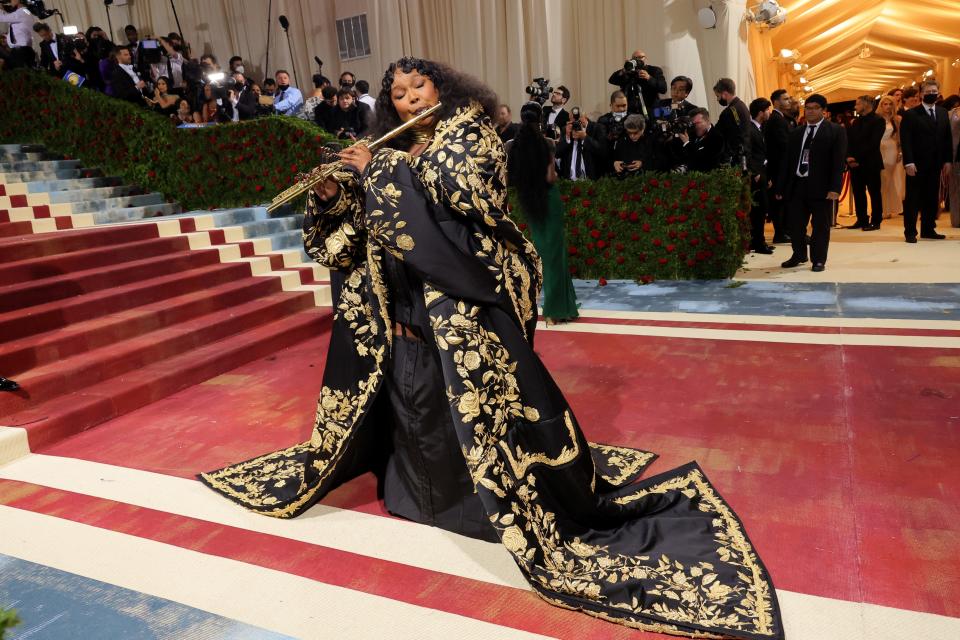Lizzo's handling of offensive lyric a stark contrast to the 'Suck it up, snowflake' crowd
- Oops!Something went wrong.Please try again later.
If you cut away the celebrity of Lizzo and focus on her solely as a human being, she just demonstrated how to deal with words others find offensive, a simple solution to a complex problem most of us, at some point, will confront.
When complaints roared forth on social media about her use of the word “spaz” in her new song “Grrrls,” the singer didn’t shout, “Political correctness run amok!” She also didn’t say to her detractors, “Suck it up, snowflakes.”
She did the right thing: She apologized, acknowledged her ignorance, corrected the problem and promised to do better.
The word in question originates from the term “spastic” and is widely considered an ableist slur. It rightfully prompted harsh backlash from both Lizzo’s fans and disability advocates. So on Tuesday, she posted a new version of the song with the offensive term removed and shared this on social media:

“It has been brought to my attention that there is a harmful word in my new song ‘Grrrls.’ Let me make one thing clear: I never want to promote derogatory language. As a fat black woman in America, I have had many hurtful words used against me so I understand the power words can have (whether intentionally, or in my case, unintentionally.)”
Words matter – we should respect that
I don’t know how that slur made it through all the producers, managers and music business officials without getting flagged in the first place. But again, let’s set aside Lizzo’s fame and whatever explanation there might be for the lyric reaching a worldwide audience. The bottom line is she sang it. It got out there. And it hurt people.
Why did it take so long?: Trump's people knew election fraud claims were 'completely nuts.' Yet they kept quiet.
She saw that it hurt people, so she recognized that, didn’t complain or push back and removed the word, in the process helping many learn why that word is offensive.
I’m not holding Lizzo up as a hero here. What I admire is the process, and the unwillingness to play defense.
While the idea of political correctness has been reviled by some for years, we’re in a moment when many words – including personal pronouns – are triggering people to become defensive, to behave stubbornly at the expense of others' actual identities.
If someone – whether it’s a child or an adult, a family member or a co-worker – uses they/them pronouns, is adjusting the words we use to describe that person really so burdensome?
The decent path is always easiest
If you regularly use the r-word and someone points out it’s deeply offensive to people with disabilities, will you just keep on using it, thinking you’re some kind of warrior standing up to the mythical “PC police”? Or will you drop it, because there are dozens upon dozens of other nonoffensive words you can use instead?
Which path is easiest? Which path is the most decent?
The plan to attack Kavanaugh: Jan. 6 was an attack on our democracy. So was a man's plan to kill Justice Kavanaugh.
I wrote a column years ago about the surge of people on the right hurling the term “libtard” – which cynically echoes the r-word – at liberals like myself. I offered up a slew of perfectly mean terms people could direct at me that didn’t have the side effect of offending an entire swath of humanity. To this day, I get email from people who stumble across that column and take valuable time out of their lives to send a note calling me that offensive word.
I don’t understand the reason for that. But I do understand the world can be a tricky place and we are all likely, at some point, to use a word we didn’t know was hurtful. When that happens, I don’t believe in piling on the person, assuming that person follows something approximating the Lizzo path: Apologize, admit you messed up and promise to do better.
What you say reflects back on you
That’s really all it takes. It gets complicated only when people dig in and say, “Nobody’s going to tell me what I can and can’t say!”
Here’s a news flash: Nobody is telling you what you can and can’t say. They’re just telling you that what you’re saying is hurtful to them. If you don’t care about that, it says nothing about the aggrieved party while saying A LOT about you.
Jan. 6 was awful: But conservatives have good reasons to question these hearings.
The great humor writer Douglas Adams once made a reference to Jesus, describing him as a man who “had been nailed to a tree for saying how great it would be to be nice to people for a change.” I think about that a lot when I see people erring on the side of cruelty.
Doing the right thing isn’t tricky. Lizzo’s response to the lyric that never should’ve found its way into her song was the right thing.
Don’t nail me to a tree over this, but it would be great if more people took the path of basic human decency for a change.
Follow USA TODAY columnist Rex Huppke on Twitter @RexHuppke and Facebook: facebook.com/RexIsAJerk
You can read diverse opinions from our Board of Contributors and other writers on the Opinion front page, on Twitter @usatodayopinion and in our daily Opinion newsletter. To respond to a column, submit a comment to letters@usatoday.com.
This article originally appeared on USA TODAY: Lizzo removes ableist slur from new song 'Grrrls,' a good step forward

